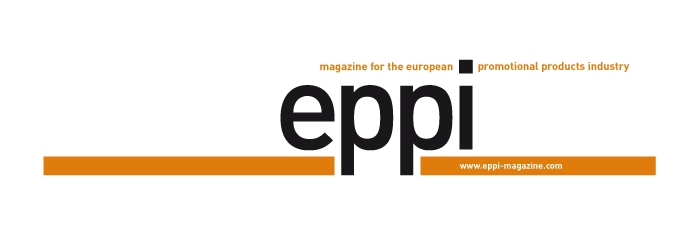Distributor groups have been networking the international industry for over 50 years and linking up local approaches with the global business. eppi magazine looks back on the history of the big international alliances, their methods of operation, recipes for success and their changing face in times of globalization.
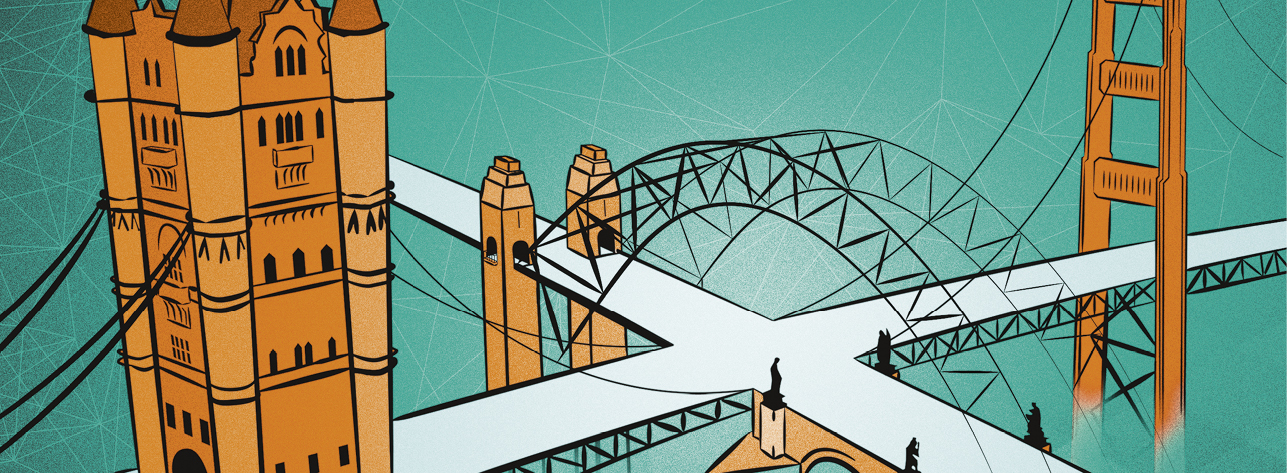
A letter instead of an email, a telephone instead of a smartphone, a typewriter instead of a computer: Against the backdrop of today’s ultra-fast and highly-technical business world, the 1950s seem like an antique world. There wasn’t anything like a promotional products market in its present form back then either. The industry was in its infancy, networks and organised structures didn’t exist – not in Europe at least. Hence, once can quite rightly call the three business people, who joined forces at the beginning of 1956, after visiting a trade fair in Blackpool, Great Britain, pioneers: On the return journey to the mainland Edith Delacheaux (Tre/O, I-Milan), Egon Eisner (Industrial Gifts, UK-London) and Oscar Eberli (Eberli Werbegeschenke, CH-Zurich) were sitting in the dining car talking about how difficult it was to find new products. They decided to look for new manufacturers and ideas together in future – and a little later on March 4, they founded the IGC (International Advertising Gift Council) in Frankfurt, today IGC Global Promotions. “At the beginning it was purely about an information exchange. The IGC founders wanted to share and thus profit from the experiences they made with the different markets,” explained Hans Poulis, CEO of IGC International, the corporation of IGC. “The first General Members Assembly took place in Zurich on September 1, 1956.”
It is a curious footnote of the industry’s history that exactly two years to the day after the foundation of the ICG a further distributor association was launched, to be precise on March 4, 1958, also in Frankfurt: Together with Georg Henze (Henze, D-Stuttgart), Fred Michel (F. Michel, F-Paris) and Ade Klein (Trouvaille, NL-Amsterdam), the initiator John H. Waser (Waser AG, CH-Zurich) launched the World Advertising Gift Exchange, WAGE for short. “In 1958 there were no companies yet that specialised exclusively in promotional products, mostly trading companies from the stationery and paper segment,” stated WAGE General Secretary Gottfried Pohn. “The aim was to found a pan-European association of trading companies that occupied themselves with the sales of products from the ‘promotion gifts’ segment.“ Whereby it must be noted that these initiatives arose before the PSI even existed – it wasn’t founded until 1960. The founder of the PSI, Walter G. Jung, acknowledged IGC and WAGE in 1996 as being an info nucleus, the prototype of the industry’s organisation.“ Indeed, the first distributor groups did define something similar to an industry and gave the market its initial contours. “Minutes of almost all meetings exist and thus the themes and the tasks at hand are very well documented. Structures were set for WAGE from the very start, which guaranteed a high efficiency for that time. John Waser, General Secretary from 1958 to 2000, managed the meetings according to a tight agenda, all of the processes and resolutions of which were recorded,” commented Pohn, who is John Waser’s successor. The focus – the official language of the meetings was incidentally at the beginning both at IGC and WAGE German – was the exchange about product novelties, successful products as well as the corresponding sources of supply. A joint procedure towards suppliers in terms of prices and delivery conditions was already discussed: “From 1960 onwards a list of preferred suppliers existed, today one would call it a database, who granted group discounts and special conditions to all WAGE members,” reported Pohn. Whereas in the 1950s and early 1960s the suppliers were still located where the members of the organisation were also based, the procurement markets changed fundamentally from the 1960s onwards. Pohn: “In 1975, individual member companies set off on their first business trips to the Far East. Already at the end of the 1970s there were organised trips to trade fairs and to producers in China, Hong Kong, Taiwan and Japan. In return it also became interesting for members from abroad as a result of the PSI Show in Düsseldorf to come to Europe and buy here.”
The development of the import markets formed the initial impulse for the foundation of the Ippag (International Partnership for Premiums and Gifts) in 1965 by Claude Barbey (Lacoray, CH-Geneva) and a number of further international entrepreneurs. “When Ippag was founded, buying and sourcing in the Far East was adventurous,” explained Thibaut Fontaine, Chairman of Ippag. “People were communicating via Telex, there was no transparency and there were no secure supply chains. So, the founders decided to help each other and share their knowledge and experience. In the early days, Ippag was essentially a sourcing cooperative, the selling part came much later.”
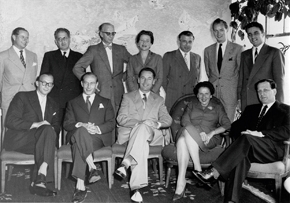
Pioneers: The first IGC meeting in September 1956…
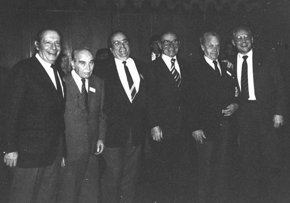
…and the first WAGE general meeting in 1959.
Growing tasks
As a result joint selling and marketing strategies and the exchange about marketing things became all the more important from the 1980s onwards. The start of the globalisation and the foundation of the EU in the year 1992 inspired and facilitated international trade, it brought the markets closer together. “About 20 years ago, the Ippag members started sharing case studies, marketing ideas and management topics, all with the background of the different member countries in mind,” reported Fontaine. “So the basic idea of Ippag – sharing – was taken to a new level.” Carrying out marketing on an international level was the intention of the ECA (European Catalogue Association) that was founded in 1986 by six promotional products distributors from six countries, the group renamed itself Eurimage in 1992. “The objective was the joint production and distribution of a catalogue with a uniform overall collection of promotional products – a totally new concept at the time,” explained Eurimage Executive Director, Ralf Hinterleitner. “Originally, one catalogue was produced a year. Selecting the products was one of the easiest tasks. The coordination of the photos, layouts, texts but also the national prices was on the other hand a big challenge at the start communicating by telephone, fax and mail dispatch. In 1987 the first catalogue was produced with a circulation of 40,000 pieces. Since 1995 the catalogue appears twice a year, with individual company covers and of course in the language of the respective member with the prices in the corresponding country currency. Its circulation exceeded 500,000 pieces for the first time in 2011.”
According to own accounts, today Eurimage, which currently comprises of eleven members in eleven European countries, is the strongest direct marketing group on the European promotional products market. In addition to the catalogue production, today’s members profit from numerous new tools, especially web shops, virtual catalogues, SEO, newsletters and an extensive ERP/ CRM system. IGC, Ippag and WAGE have also experienced significant growth since their founding days and boast two-digit membership figures (see box for overview and comparison). The members of the three groups are frequently among the leading promotional products agencies in their respective country of origin and have considerable market power, a high degree of innovation and a wealth of experience in all areas of the promotional products business. At the same time, the markets differ in which the member companies operate, in some cases very strongly. As a result, very different types of companies come together – regarding the turnover on the one hand, but also in terms of the organisational structures and forms of distribution. “That makes the organisation very vibrant,” remarked Pohn. Sharing this wealth of experience is an enormous enrichment for all members. “Being part of the organisation opens up the mind and brings with it a steady flow of information,” explained Fontaine. “It is also a constant positive challenge. You learn a lot about and from the members, who contribute so many different approaches. Once you’ve had a meeting in a certain country, it is much easier to deal with suppliers from that market, for instance.”
| Name | Type | Founding year | Members | Total members’ turnover | Headquarter | Legal structure | Corporation for joint contracting |
| IGC Global Promotions |
International distributor alliance and contract partner |
1956 | 48 | 500 mil. US Dollars | NL-Rotterdam | Dutch public limited-liability company (NV) |
IGC International, NL-Rotterdam |
| Ippag (International Partnership for Premiums and Gifts) |
International distributor alliance and contract partner |
1965 | 29 | 280 mil. Euros | CH-Basel | Cooperative under Swiss law (Genossenschaft) |
Prominate Ltd, UK-London |
| WAGE (World Advertising Gift Exchange) |
International distributor alliance |
1958 | 20 | 330 mil. Euros | A-Pasching | Nonprofit organisation, registered in Austria |
no |
| Eurimage | Catalogue and marketing cooperative |
1986 | 11 | n/a | D-Potsdam | Holding (A/S) | no |
Source: IGC, Ippag, WAGE, Eurimage
Trusting partnerships
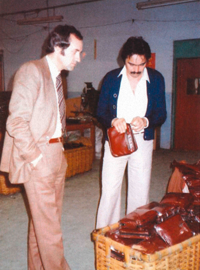
The Ippag members Fritz Bauer (l) and Peter Iwen on their first visit to Asia in 1979.
Of course such a close exchange is by no means matter of course. After all, the members show other companies their hands and reveal in some cases highly-sensitive details about their company – this involves an incredible amount of mutual trust. This is why all four organisations follow the strict rule that only one company per country is allowed to join. “Every Ippag member needs to be secured that he is autonomous in his own country,” explained Fontaine. “This is very important for maintaining the trust and the good relationships between the cooperative members. We cannot allow companies with subsidiaries in several countries, if a member company expands significantly into another national market, this challenges their place within the cooperative.” Hinterleitner confirmed: “Eurimage members work intensively together on a partner-like basis, this is only possible without internal competition. That is why there is only one member per country. We are currently particularly looking for members for Germany, Holland, Sweden, Poland and Hungary. The prerequisites for new members are disposing of the corresponding industry experience and the desire to expand their business as well as a corresponding financial capacity and headcount.“
Only the IGC has six members in the USA and two in Canada. “The fact that we deviate from our ‘one member per country’ rule in these cases, is simply due to the geographical size of the markets there,” explained Poulis. “However, unlimited trust also exists between these companies – everyone knows that he can generate more profit when acting as a united whole instead of alone.“ New members are in any case carefully selected and recruited. Fontaine: “A new member company has to fulfil some minimum requirements: It has to have been in our business for at least four years and it has to have an annual turnover of over 1 mil. Euros. Much more important is that it has to fit in with our philosophy, with regards to its management and corporate culture, its purchasing process and its approach towards the big issues we all deal with. Companies need to be motivated to contribute to the group and willing to share. They also have to sign our Code of Conduct, which is based on the ETI (Ethical Trading Initiative) and the United Nations Guiding Principles on Business and Human Rights (UNGPs). New member companies are proposed by the board and voted for by the members. Of course, we always visit prospective companies beforehand.“ “There are fixed parameters that have to be fulfilled without exception,” confirmed Pohn. “This starts with the reputation: The company has to prove that it has a healthy financial basis and document this annually, furthermore it has to have been one of the renowned market players in the respective country over a longer period of time as well as achieving the minimum set turnover. The company additionally has to follow an international procurement strategy and permanently visit trade fairs abroad. However, a further essential factor is that the entrepreneurs themselves fit in with the group in terms of their personality. These criteria are also the reason for the in most cases very good personal relations between the WAGE members.“
Such friendships can of course only be groomed if the membership figures don’t exceed a certain level – unlimited growth is contraproductive for a well-functioning distributor alliance, as Fontaine explained: “We don’t want to be the biggest distributor alliance in the world. Our strategy is quality, not quantity. So, we are only looking for a new country member if one company has left. We recruit new members very selectively. If the organisation becomes too big, it becomes too anonymous and the trust between the members might be affected.”
Friends hosting the world
The mutual trust has always been intensified during the meetings that are regularly conducted by all of the organisations with similar aims. The get-togethers are a central tool for the exchange of information, the development of joint initiatives as well as last, but not least to groom the friendships. “Each member has to make a targeted contribution and among others explain his own market presence, here comparisons to colleagues in other countries are made. We particularly gain feedback and suggestions from the USA for example that are not familiar in Europe,” reported Pohn. “During the urban meetings that each take place in the autumn, we meet up at the company premises of a member and compare the company standards. Here the focus lies on the informal exchange, we normally don’t discuss products here, but instead operational key data, customer recruiting, the optimisation of processes, the presence in the social media, etc.” Ippag also meets up several times a year, among others in the Far East as well as for the annual meeting at the location of one of the members, which often go down in the annuals of the Ippag history with spectacular activities. “At the annual meeting in Hong Kong in April we sign official documents, share figures and the results of our annual survey, talk about the last year and future strategies, share best practice and invite Chinese suppliers from our partner programme for a supplier evening,” reported Fontaine. “We also invite a keynote speaker from a relevant field. Another annual meeting takes place by invitation of and at the location of one of our members. At all our meetings, the fun, the informal activities and the pursuit of friendship is extremely important.”
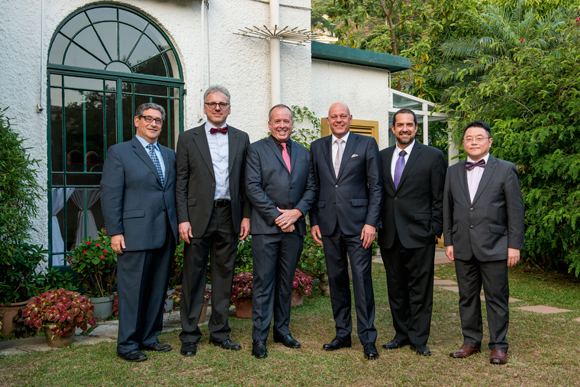
From all over the world – the IGC Global Promotions Board of Directors (f.t.l.): Jay Nathanson (Target Marketing, USA), Norbert Alt (admixx, D), Michael Emoff (Shumsky, USA), CEO Hans Poulis (NL), Benson Leigh (Servicios Ilimitados, PE) and Samuel Ling (Hiromori, Asia).
Far-reaching initiatives
Far-reaching initiatives arise from the basis of such cooperation, for example in the area of sourcing: The verbal exchange about sources of supply as well as the first directories of the early days have developed into highly-professional, IT-based platforms. Fontaine: “Our sourcing platform is a huge database every member has to contribute to. At the same time, it is like a toolbox that every member can take what he needs from. The best suppliers are invited to partake in our Partner Suppliers Program. We share new suppliers at regular purchase meetings. Of course, we also try to buy together wherever possible, because together we have a huge purchasing power.” Pohn added: “Our joint supplier database is a highly-efficient tool that is unique in its form. An advantage for every member is that the costs are split between the group. All of the international applied testing and certification guidelines form part of the assessment of the suppliers and are documented in the database.”
The latter is an aspect, which plays major role when it comes down to sourcing – the sources of supply are often open anyway, however the protection of the supply chains is as imperative as it is demanding. Here, cooperatives can massively implement their synergies to master. “Our CSR program really gained momentum about ten years ago, pushed by the Scandinavian members,” reported Fontaine. “Today, it is one of our central projects. We have one full-time employee working on our database, which is constantly updated and improved. Members can search via key words and find all relevant information, including audit reports and certificates within seconds. Ippag also leads the groups’ involvement with the United Nations Global Compact initiative and helps its members implement the BSCI (Business Social Compliance Initiative) framework throughout their supply chains.”
The IGC also has a highly-developed database system for the documentation of supply sources and CSR standards. Poulis: “Ten years ago the main goal of the global players among the users was ‘saving costs’. Today it is reducing risks. A safe supply chain is one of the most important tasks that users – and thus also promotional products agencies – have to occupy themselves with.“
Global approach, local service
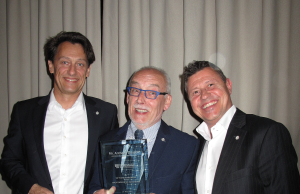
Eurimage founder Anthony Driscoll (m) with CEO Ralf Hinterleitner (l) and President Alex Roethlisberger at the 30th anniversary meeting in 2016.
However, the “all-round care-free package“ that IGC, Ippag and Wage can offer comprises of much more, namely international market expertise: “The marketing departments of our member companies can say precisely which products go down well in the respective markets,” explained Poulis. “In this way, we can provide clients with customer reports, that provide information about what is in demand and what is needed in China, Mexico or the USA.“
An expertise that has been increasingly demanded for years – in the course of a massive trend towards centralisation. Because more and more multinationals indeed want to serve the need for haptic advertising media locally, but nevertheless, handle them centrally. Some multinationals have hundreds of suppliers, this massively drives the costs of ownership upwards. If the purchasing is centralised, the efficiency is improved enormously and the costs drop considerably. That is why global processes together with the necessary infrastructure – i.e.: IT – have become extremely important,“ stated Poulis, whowas appointed CEO of the stock corporation IGC Global Promotions NV in 2011. On founding the stock company that all members are shareholders of, the IGC changed its alignment. “Today, we no longer concentrate on joint procurement, but are 100% focused on commercial activities,” commented Poulis. “This is what distinguishes us from other groups.” An even stronger focus on international contract conclusions and a further reinforcement of the stock corporation as an autonomously operating company occurred at the beginning of April 2017 with the foundation of IGC International: “IGC international is part of IGC Global Promotions, the shareholders of IGC International are the IGC member companies and myself. Our face towards the customers, though, is the face of a big distributor company, with an autonomously operating office and a team in Rotterdam. Of course, we fall back on the creativity, expertise and local power of the IGC members – as well as on a state-of-the-art IT platform.”
With Ippag Global Promotions, Ippag also founded a corporation to draw up global contracts on behalf of its members in 2012. Some, but not all of the Ippag members became shareholders. Fontaine: “Before Ippag Global Promotions was founded five years ago, there were no formal multinational contracts signed by Ippag members. There had only been projects where several member companies were working with an international client, but these were quite local and they were happening between members and not under the umbrella of Ippag. As the markets became more and more international and the need for global fulfilment and a one-stop model grew, we founded Ippag Global Promotions as a separate entity to be able to fulfil such demand. The transformation of Ippag Global Promotions into Prominate at the beginning of 2017 reflects the growth of this business entity.”
Prominate Ltd, that is based in London, serves large, multinational contract partners from this location and develops autonomously, but in line with the approach of the shareholders, who are all members of the Ippag cooperative. However, the foundation of a stock corporation is not a theme at WAGE, as Pohn explained: “We have no such initiative and there won’t be one in future either, because the principles of an association for the purpose of mutual support and those of a stock corporation are very contradictory. Here, we differ significantly from the IGC and Ippag.“ Fontaine also emphasises that the cooperative as an autonomous corporation still plays an important role: “The two bodies are totally independent and very different from each other. The value of a company is the money on the table, the value of a cooperative is written on a different piece of paper.” And this value is without doubt very high – especially since the challenges in the industry are increasing both on a local and global level: “With the digital transformation and new players like Amazon and Vistaprint emerging, the market and the industry are becoming more complicated and challenging,” added Fontaine. “These changes will affect our business, but they won’t affect Ippag. On the contrary, Ippag will help to answer many questions and to meet the challenge. You need to be together to fight problems. If there weren’t any challenges, there’d be no need to organise.“
So networking and building bridges to colleagues all over the world remains to be a worthwhile investment. Fontaine is convinced: “Joining Ippag was the best decision I ever made for my company. You open up to different countries and different markets, which is extremely important in our business. We are friends – that’s what makes the difference.” Especially in a globalised world, which is noticeably fragmented and in which being cosmopolitan is an asset, which cannot be appraised highly enough.
// Till Barth
photos: Archive WA Media (1); Eurimage (1); IGC Global Promotions (2); WAGE (1)


